
Elton John is the second studio album by English singer-songwriter Elton John. It was released on 10 April 1970 by DJM Records and by Uni Records in United States. The album was the first release by John in the United States because Empty Sky was not released in the country until 1975.
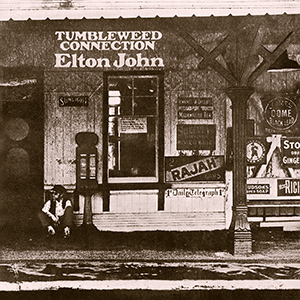
Tumbleweed Connection is the third studio album by English singer-songwriter Elton John. It was recorded at Trident Studios, London, England in March 1970, and released in October 1970 in the United Kingdom and January 1971 in the United States. It is a concept album based on country and western/Americana themes. All songs are written by John and Bernie Taupin, with the exception of "Love Song" by Lesley Duncan.
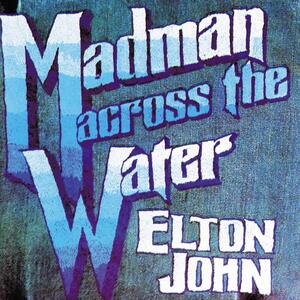
Madman Across the Water is the fourth studio album by English musician Elton John, released in 1971 through DJM and Uni Records. The album was his third album to be released in 1971, at which point John had been rising to prominence as a popular music artist. John's first progressive rock album, Madman Across the Water contains nine tracks, each composed and performed by John and with lyrics written by songwriting partner Bernie Taupin. Yes keyboardist Rick Wakeman plays Hammond organ on two songs.

Honky Château is the fifth studio album by English musician Elton John. It was released in 1972, and was titled after the 18th century French chateau where it was recorded, Château d'Hérouville. The album reached number one in the US, the first of John's seven consecutive US number one albums.
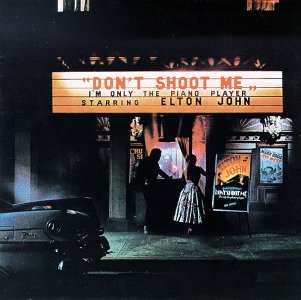
Don't Shoot Me I'm Only the Piano Player is the sixth studio album by English musician Elton John. Released in January 1973 by DJM Records, it was the first of two studio albums he released in 1973, and was his second straight No. 1 album in the US and first No. 1 album in the UK.
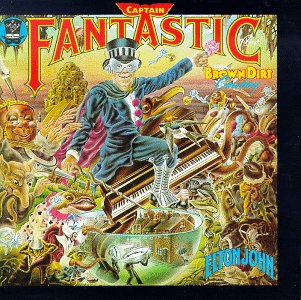
Captain Fantastic and the Brown Dirt Cowboy is the ninth studio album by English musician Elton John. The album is an autobiographical account of the early musical careers of Elton John and his long-term lyricist Bernie Taupin. It was released in May 1975 by MCA Records in America and DJM in the UK and was an instant commercial success. The album was certified gold before its release, and reached No. 1 in its first week of release on the US Billboard 200, the first album to achieve both honors. It sold 1.4 million copies within four days of release, and stayed in the top position in the chart for seven weeks.

Rock of the Westies is the tenth studio album by English musician Elton John, released on 4 October 1975. The title is a spoonerism on the phrase "West of the Rockies", the album having been recorded at Caribou Ranch in the Rocky Mountains of Colorado.

Blue Moves is the eleventh studio album by English musician Elton John. It was released in October 1976. It was John's second double album and the first to be released by his own label, Rocket Records Ltd. The album reached number 3 in the US charts, ending a long streak of chart-topping albums for John that began with Honky Château in 1972.

"Candle in the Wind" is a threnody written by English musician Elton John and songwriter Bernie Taupin, and performed by John. It was originally written in 1973, in honour of Marilyn Monroe, who had died 11 years earlier.

It Ain't Easy is a 1971 album by Long John Baldry. It marked his return to the edgier blues sound that he performed in the mid-60s. It was Baldry's fifth solo album.

David William Logan Johnstone is a British rock guitarist and vocalist, best known for his long-time collaboration with Elton John as a member of the Elton John Band.

Breaking Hearts is the eighteenth studio album by English musician Elton John. It features the quartet of John, Davey Johnstone, Dee Murray and Nigel Olsson. There were four top-40 singles from the album: "Sad Songs ", "Who Wears These Shoes", "In Neon", and the UK No. 5 hit "Passengers".
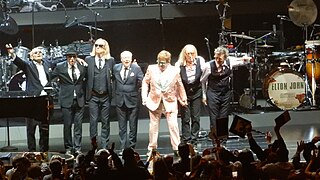
The Elton John Band is the band that backs singer, composer and pianist Elton John on both studio and live recordings. The band has gone through several lineup changes, but Nigel Olsson, Davey Johnstone, and Ray Cooper have been members since 1970, 1971 and 1973 respectively. The various lineups of the band have consisted of both English and American musicians. The band is often not recognised as a formal entity, and is instead referred to simply as the Elton John Band.
Caleb Quaye, is an English rock guitarist and studio musician best known for his work in the 1960s and 1970s with Elton John, Mick Jagger, Pete Townshend, Paul McCartney, Hall & Oates and Ralph McTell, and also toured with Shawn Phillips in the 1970s. He is the son of Cab Kaye, younger brother of Terri Quaye, and older half-brother of singer Finley Quaye.
"Crazy Water" is a song by English musician Elton John with lyrics written by Bernie Taupin. It is the seventh track on his 1976 album, Blue Moves. It was released as a single in the UK in February 1977. The single reached No. 27 in the UK singles charts.
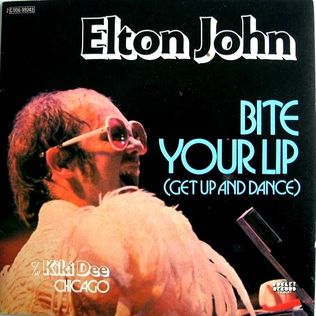
"Bite Your Lip " is a song co-written by English musician Elton John with lyrics by Bernie Taupin. It is the closing track of his 1976 album, Blue Moves. It came out as a single two months after the release of the album. The US b-side was another album track, "Chameleon", which was also featured on the "Crazy Water" single that only came out in the UK, only four days later, but the UK release of 'Bite Your Lip' was released as a double-A side single, which was backed with 'Chicago' by Kiki Dee, making the release a joint chart effort. The single peaked at No. 28 in both the U.S. and the UK. 500 copies were sent to radio DJ's on a special 12" edition, by The Rocket Record Company.

Tommy is a soundtrack album by The Who with contributions from numerous artists. The soundtrack was used in the 1975 Tommy film that was based on the original album that was released by The Who in 1969. Pete Townshend oversaw the production of this double-LP recording that returned the music to its rock roots, and on which the unrecorded orchestral arrangements he had envisaged for the original Tommy LP were realised by the extensive use of synthesiser.

Passengers is a 1984 song by English musician Elton John that appears on his 1984 album Breaking Hearts, released as the second single of the album. The song reached number five on the UK chart, and reached the top ten in Australia, but was not released as a single in the US.

Regimental Sgt. Zippo is the thirty-first studio album by English musician Elton John. Originally recorded in 1967 and 1968, it remained unreleased until Record Store Day of June 2021, when the mono version was issued on vinyl. In early July 2022, the album saw a broader release in stereo vinyl and stereo/mono CD.
"We All Fall in Love Sometimes" is the ninth track on Elton John's album Captain Fantastic and the Brown Dirt Cowboy, written by John (music) and Bernie Taupin (lyrics) released in 1975.
















